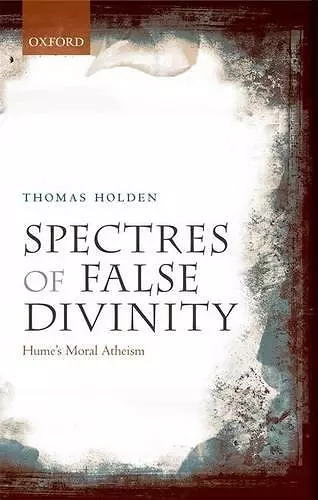Spectres of False Divinity
Hume's Moral Atheism
Format:Hardback
Publisher:Oxford University Press
Published:11th Mar '10
Currently unavailable, and unfortunately no date known when it will be back
This hardback is available in another edition too:
- Paperback£35.99(9780199645947)

Spectres of False Divinity presents a historical and critical interpretation of Hume's rejection of the existence of a deity with moral attributes. In Hume's view, no first cause or designer responsible for the ordered universe could possibly have moral attributes; nor could the existence (or non-existence) of such a being have any real implications for human practice or conduct. Hume's case for this 'moral atheism' is a central plank of both his naturalistic agenda in metaphysics and his secularizing program in moral theory. It complements his wider critique of traditional theism, and threatens to rule out any religion that would make claims on moral practice. Thomas Holden situates Hume's commitment to moral atheism in its historical and philosophical context, offers a systematic interpretation of his case for divine amorality, and shows how Hume can endorse moral atheism while maintaining his skeptical attitude toward traditional forms of cosmological and theological speculation.
Spectres of False Divinity is an impressive work. * Kenneth R. Merrill, Mind *
In seeking to integrate Hume's theories concerning moral psychology with his well-known critiques of natural theology, this monograph provides an important exercise in reading Hume holistically. * Robert A. Larmer, Journal of Religious Studies *
Holden's case is meticulously argued, textually scrupulous and generally persuasive. Although he engages in technical philosophical discussion at an advanced level, he does so with commendable clarity. * Gavin Hyman, Theology *
Thomas Holden's Spectres of False Divinity is an important book that makes three significant contributions to the literature on Hume's philosophy of religion. First, it clarifies Hume's methodological approach to religious epistemology. Second, it clarifies a central and critical aspect of his irreligious program. Third, it offers a thought-provoking and innovative interpretation of his position on the arguments from evil and determinism... it is an interesting and very worthwhile read. * Rico Vitz, Notre Dame Philosophical Reviews *
Hume may not persuade everyone that his moral and theological positions are correct, but Holdens study of his work is an important contribution to clarifying his ideas and their significance. It deserves to be read carefully and its points pondered seriously. * David A. Pailin, Journal of Theological Studies *
While the idea of Hume as a moral atheist is not new, Holden's case for that proposition makes two new and important contributions to the discussion of the issue. * David O'Connor, Hume Studies *
Spectres of False Divinity is an impressive work. Holden is in firm control of the evidence he marshals in support of his principal thesis about Hume's moral atheism. ... the frequent inclusion of interesting and illuminating historical material is one of the excellences of the book. Another virtue is the uniformly scrupulous attention Holden pays to objections and even some possible objections to the various claims he makes. * Kenneth R. Merrill, Mind *
ISBN: 9780199579945
Dimensions: 223mm x 144mm x 23mm
Weight: 466g
264 pages